Posts Tagged ‘Joanna Scanlan’
75th BAFTA Awards / The British Academy Film Awards
The 75th British Academy Film Awards, also known as the BAFAs, were held on 13 March 2022 at the Royal Albert Hall in London, honouring the best national and foreign films of 2021.
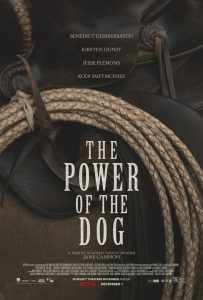
Best Film: The Power of the Dog
Best Director: Jane Campion – The Power of the Dog
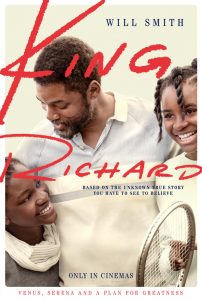
Best Actor: Will Smith – King Richard

Best Actress: Joanna Scanlan – After Love

Best Supporting Actor: Troy Kotsur – CODA

Best Supporting Actress: Ariana de Bose – West Side Story
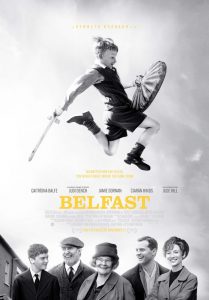
Best British Film: Belfast directed by Kenneth Branagh
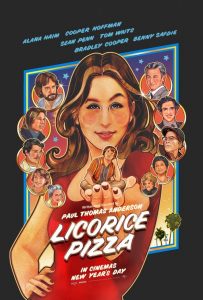
Best Original Screenplay: Licorice Pizza – Paul Thomas Anderson
Best Adapted Screenplay: CODA

Best Costume Design: Jenny Beavan – Cruella

Best Foreign Language Film: Drive My Car directed by Ryûsuke Hamaguchi
Rising Star Award: Lashana Lynch
The Provider for Both Worlds
After Love
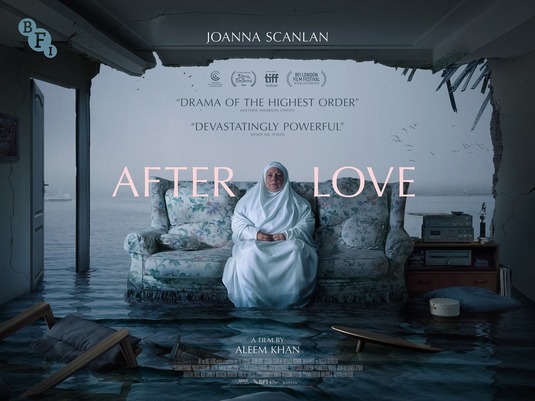
Director: Aleem Khan
Cast: Joanna Scanlan, Nathalie Richard, Talid Ariss, Nasser Memarzia
This film is in English, French and Urdu with subtitles
Screened virtually at the 2021 European Film Festival
British Pakistani film director Aleem Khan makes his impressive feature length debut with his thought provoking film After Love starring the amazing British actress Joanna Scanlan (Tulip Fever, Notes on a Scandal, Testament of Youth) and French actress Nathalie Richard who share a unique bond, which is complicated, maternal and at times malicious.

After Love shot mainly in Dover and in Calais, centres on a British woman who converted to Islam to marry her adoring Pakistani husband Ahmed briefly played by Nasser Memarzia.
Unfortunately, Ahmed dies of a sudden heart attack leaving his wife Mary beautifully portrayed by Joanna Scanlan who inhabits every frame of the screen, is left adrift.
Mary soon discovers that her late husband had a lover living in Calais, France just 21 miles away across the English Channel. Summoning all the courage in the world, Mary makes the journey to Calais to meet her late husband’s lover, a vivacious blond named Genevieve wonderfully played by Nathalie Richard who is not only coping with being a single mother but is in the process of moving to a bigger home in Calais.

Genevieve has to contend with Ahmed’s biological son Solomon played by Talid Ariss who constantly resents his mother and is harbouring sexual secrets of his own, a teenager bristling with attitude and deceit as he constantly wonders where his wayward father is.
In a careful plot twist, Genevieve mistakes Mary as an agency housekeeper coming to help her tidy up and move home. Mary knowingly insinuates herself into the complex lives of Genevieve and her obstreperous teenage son, while keeping her real identity private until all the secrets and lies are revealed in one final family dinner.

Joanna Scanlan is amazing in her first major role as the protagonist playing a white British Muslim woman who has to not only deal with her late husband’s death but the wider implications of discovering that he had a mistress and son across the Channel.
After Love is a careful study of the complex lives people live without becoming preachy or didactic, held together by a superbly understated performance by Scanlan who holds the entire film together even as her character’s world is both figuratively and literally changing around her. Joanna Scanlan deserves an Oscar nomination for this role. She is absolutely superb.
After Love debuted at the Cannes and Thessalonki Film festival in 2020 and now viewers can catch this fascinating film at the 2021 European film Festival online.
It’s highly recommended viewing and gets a film rating of 7.5 out of 10.
The Conception of an Affair
Tulip Fever
Director: Justin Chadwick
Cast: Alicia Vikander, Christoph Waltz, Dane DeHaan, Cara Delevingne, Judi Dench, Jack O’Connell, Kevin McKidd, Holliday Grainger, Tom Hollander, Zach Galifianakis, Joanna Scanlan, David Harewood, Sebastian Armesto, Matthew Morrison, Douglas Hodge
British director Justin Chadwick (The Other Boleyn Girl, Mandela: The Long Walk to Freedom, The First Grader) tackles a cinematic version of Deborah Moggarch’s novel Tulip Fever with the literary assistance of Anna Karenina screenwriter Tom Stoppard.
Assembling an international cast including Oscar winner Christoph Waltz (Django Unchained) and fellow Oscar winner Alicia Vikander (The Danish Girl), Tulip Fever is set in Amsterdam in 1623 at the height of the Tulip trade which flourished in the Netherlands and was in essence the first stock market which blossomed illicitly behind Tavern doors and co-opted by solicitous nuns who grew the beautiful flowers in sacred abbeys away from the hustle of Dutch city life.
With sumptuous costumes by Michael O’Connor and suitably dark production design by Simon Elliott, Tulip Fever focuses on the young orphan Sophia Sandvoort superbly played by Vikander who is forced to marry the wealthy yet childless Burgermeester (local mayor) Cornelious Sandvoort played by Waltz.
Like all Dutch noblemen, Sandvoort commissions a young and impoverished painter to paint the couple’s portrait, a 17th century trend which made Rembrandt famous. In steps the exuberant and excitable Jan van Loos played by Dane DeHaan (Valerian, Kill Your Darlings).
Soon van Loos falls for the ravishing Sophia and deception is conceived mainly for her to escape from her pompous husband who really wants to impregnate her with his preferably male heir.
In a parallel narrative, Sophia’s devoted maid, Maria played by British actress Holliday Grainger (Jane Eyre, The Finest Hours, Cinderella) has fallen for the charming if not smelly fishmonger Willem Bok played by Jack O’Connell (Unbroken) who aspire to get married and have six children together.
In a bizarre twist both Bok and van Loos, two young men desperately trying to increase their liquidity embark on making money on the booming tulip trade, in which the precious bulbs fluctuated in price depending on their rarity and natural beauty of the elusive flower.
Oscar winner Judi Dench (Shakespeare in Love) plays the Abbess who has to sternly guide the young men in the flourishing yet turbulent tulip trade while the Netherlands was expanding its colonial empire to the Dutch East Indies and South Africa.
Despite the slightly convoluted plot and frenetic story line, Tulip Fever is an enjoyable and raunchy period drama held together by amazing performances by the four main leads which serves as a Dutch version of Twelfth Night.
Audiences that enjoyed Girl with a Pearl Earring and Shakespeare in Love, will undoubtedly love Tulip Fever, which provides a fascinating cinematic perspective on the brief but flourishing Tulip trade which made the Netherlands one of the riches countries in Europe especially in the 17th century, establishing their own national stability and making them the money lenders of Europe.
With all the deceit, obsession and money trading, Tulip Fever is a riotous period drama and gets a film rating of 7 out of 10.
Tulip Fever is recommended viewing as a historical drama with a uniquely Dutch twist.
Overdue but worth the wait
Bridget Jones’ Baby
Director: Sharon Maguire
Cast: Renee Zellweger, Colin Firth, Patrick Dempsey, Gemma Jones, Jim Broadbent, Emma Thompson, Julian Rhind-Tutt, Joanna Scanlan, Sarah Solemani, Celia Imrie
Oscar winner Renee Zellweger (Cold Mountain) after a six year screen absence reprises her role of Bridget Jones in the third instalment of the hit film franchise, simply entitled Bridget Jones’ Baby. The first two films were based on the bestselling novels by Helen Fielding. Zellweger tackles her role of Bridget Jones with familiar vigour and she is joined onscreen for continuity purposes by Oscar winner Colin Firth (The King’s Speech) as uptight London lawyer Mark Darcy and new comer Patrick Dempsey as dating expert Jack Qwaint.
Zellweger and Firth have matured as actors which is evident onscreen, for the best scenes in Bridget Jones’ Baby is shared between them.
Bridget Jones finds herself at 43, working as a TV assistant producer for a zany London talk show which is being threatened by a group millennials. She begins to question whether she will ever have a baby, because let’s face it her biological clock is ticking. Never fear!
With the help of her new best friend the naughty TV host Miranda, wonderfully played by Sarah Solemani, Bridget Jones soon lands up having amorous relationships first with Jack at a music festival which strongly resembles Glastonbury, shorty followed by a similar sexy scene where Jones and Darcy rekindle their much repressed love for each other at a Christening of a mutual friends baby.
As per the film’s title, Bridget Jones soon finds herself knocked up but not quite sure who the father is. Enter a delightful cameo by Emma Thompson as her droll doctor who plays along for the sake of decency.
Bridget Jones also has to break the news of her pregnancy to her parents. Her mother who is running for some minor political office is superbly played by Gemma Jones and her father once again played by Oscar winner Jim Broadbent (Iris) is naturally supportive of his daughter carrying their first grandchild despite her not quite knowing who the father is.
I would be lying if Bridget Jones’ Baby is not aimed at a female audience, as the primary narrative in the film is about the main characters pregnancy and her impending birth, as well as trying to survive the pregnancy with the help of two potential fathers who naturally see themselves as rivals. There is a hilarious scene when Bridget Jones has to be rushed to the hospital only to eventually be carried by both of them, Mark Darcy and Jack Qwaint.
With the help of a delightfully witty script, director Sharon Maguire does justice to the Bridget Jones franchise even leaving the possibility open for a fourth film since Jones’ other main suitor the devilishly handsome Daniel Cleaver who was played by Hugh Grant in the first two films is feared dead, but body yet to be recovered…
Whilst the first half of Bridget Jones’ Baby is fun and quirky, with lots of hilarious moments, the second half does drag a bit, which was done intentionally so that the audiences could appreciate the baby when he finally arrives. Essentially, Bridget Jones’ Baby is highly recommended viewing, and should be a hit with the gang of book club ladies both young and old who seemed to pack the cinemas, shifting the film to number one at the box office.
The Virtues of Vera
Testament of Youth
Director: James Kent
Cast: Alicia Vikander, Kit Harrington, Taron Egerton, Emily Watson, Dominic West, Hayley Atwell, Miranda Richardson, Colin Morgan, Joanna Scanlan
Swedish actress Alicia Vikander has come a long way from her vivacious debut as Kitty in Joe Wright’s film Anna Karenina.
In director James Kent’s film adaptation of the 1930’s novel Testament of Youth, Vikander plays aspiring novelist and soon to be pacifist Vera Brittain. The film opens in an idyllic setting resembling an English summer garden with Vera and her brother Edward played by rising star Taron Egerton, last seen in Legend along with his friends Victor Richardson played by Colin Morgan and the dashing Roland Leighton, wonderfully played by Kit Harrington of the hit HBO TV series Game of Thrones.
As a petulant young woman, Brittain objects to her father buying her a piano and strongly presents her case to her parents played by Emily Watson and Dominic West that all she really desires is to go to Oxford and study literature and classics.
At the outset of Testament of Youth, Vera Brittain is portrayed as a strong-minded young woman who was extremely close to her brother Edward and his group of friends which were all destined to study at Oxford. Destiny has different plans when in 1914, Europe is plunged into the bloody and brutal First World War, which initially everyone who enlisted thought would only lost a couple of months.
Her brother and his friends all enrol into the British army and go and fight in France, in the muddy trenches and soon the War develops into a brutal protracted affair. Vera soon abandons her plans for Oxford and enrols to be a nurse to assist the war effort.
Unlike Joe Wright’s brilliant and beautiful adaptation of Ian McEwan’s novel Atonement about doomed love during the Second World War, Testament of Youth does not maintain the same emotional resonance although dealing with similar themes. Vikander holds her own as the passionate and outspoken Vera Brittain.
Her quest to find her brother Edward, leads her to the front lines in France in 1917 where she is forced to take care not only for wounded British soldiers but also for the wounded and dying German soldiers, making her realize that despite the politics, war effects everyone equally, a devastating loss for both the victorious and defeated nations.
Which is precisely why over a hundred years later, Armistice Day is still celebrated on the 11th November as a commemoration of those countless lives sacrificed during World War 1 and a warning about the perils of embarking on future wars which is especially relevant in the conflict strewn geo-political arena of the 21st century.
After World War 1, Vera Brittain became a vocal pacifist and an anti-war campaigner. She dealt with her huge grief by publishing all the letters of her brother and his friends as well as her own memoirs in 1933 of that horrific time during the war, where she witnessed the brutality and infinite loss of life first hand as a nurse.
Testament of Youth is a fascinating look at the naivety of war through the eyes of a generation which were obliterated by its devastating effects. At some point the film, does not manage to maximise the emotional resonance, which films like Atonement and The English Patient did so brilliantly.
Nevertheless Testament of Youth remains a damning anti-war indictment and an accurate historical portrait of a lost generation, right down to the soft focus production design and period costumes.
Audiences should look out for cameo appearances by Hayley Atwell (Brideshead Revisited) as well as Miranda Richardson (The Young Victoria, Damage) as the stern Oxford professor who recognizes Vera Brittain’s potential as a young writer. Recommended viewing for ardent fans of historical cinema.
Source: Vera Brittain
In The Shadow of a Literary Giant
The Invisible Woman
Director: Ralph Fiennes
Cast: Ralph Fiennes, Felicity Jones, Kristin Scott Thomas, Tom Hollander, Michelle Fairley, Michael Marcus, Joanna Scanlan, Amanda Hale
Oscar nominated actor Ralph Fiennes follows up his first directorial debut Coriolanus with a film adaptation of a novel by Claire Tomlin, The Invisible Woman, which centres on the brief but doomed love affair between celebrated Victorian novelist Charles Dickens and Nelly, known as Ellen Tiernan a young actress half his age, superbly played by Felicity Jones of Hysteria fame.
As a director Ralph Fiennes seems to find his creativity for portraying the Victorians from skilled director Jane Campion with many shots looking like a pastiche of scenes from her hit film The Piano and the later film Bright Star.
As an actor Ralph Fiennes who also plays Charles Dickens is naturally brilliant, inhabiting a larger than life famed author who clearly desired literary attention and popularity more than the love of his massive family. Fiennes does not detract from Dickens reputation as one of the greatest Victorian novelists of the 19th century who went to detailed efforts to document through literature the hardships of the British population during the Industrial Revolution especially illustrated in his celebrated novels Oliver Twist, Hard Times and Bleak House.
This period of literature especially during the mid 19th century and which characterized the reign of Queen Victoria was called realism and along with Dickens, spawned a range of brilliant social commentators including George Eliot, Elizabeth Gaskell and Thomas Hardy who all highlighted the plight of the poor especially the appalling conditions of child labour.
The Invisible Woman centres on the period of friendship between Charles Dickens and the novelist and playwright Wilkie Collins, http://en.wikipedia.org/wiki/Wilkie_Collins played by Tom Hollander who wrote The Woman in White in the early 1850s. Here Dickens, aged 45 in rehearsal for The Frozen Deep, a collaborative play written with Collins he meets the gorgeous Nelly (Ellen Tiernan) along with her supportive mother Mrs Frances Tiernan played by Kristin Scott Thomas, ironically Fiennes co star in the Oscar winning film The English Patient.
Despite being married with 10 children, and a 27 year age difference Charles Dickens is scandalously captivated by Nelly who is actually the same age as his oldest son Charles Junior played by Michael Marcus and there is an awkward scene in the film whereby Dickens Sr having resolved to separate from his wife is walking with Nelly through Hampstead and comes across his oldest son Charles, who discover the affair.
Unfortunately as illustrated in The Invisible Woman the love affair between Dickens and Nelly is short lived but she remains the muse for Estella the female character in Dickens most accessible and famous work Great Expectations (published in 1861) who Pip falls in love with.
Felicity Jones adds layers of subtlety and complexity to the character of Nelly a woman who becomes the object of the great novelist’s affection who soon realizes that their affair is ultimately doomed and she will be the one most affected by this relationship. For Dickens, his love of fame and literary greatness trumps any real devotion to Nelly and naturally divorce was out of the question. Nelly realizes that she is living in the shadow of a literary giant and her role in his success will be eclipsed by his fame and popularity.
The Invisible Woman is a thought-provoking and intelligent period piece which at times lacks variety and is slow moving. Fiennes as a director makes a fatal decision not to use much soundtrack in the film, which clearly needs a more suitable musical score. At least The Invisible Woman got nominated for Best Costume Design but lost out to The Great Gatsby at the 2014 Academy Awards.
Viewers get the impression that if Ralph Fiennes had been content on just playing Dickens and letting a more experienced director like Mike Newell or Jane Campion remain behind the camera, The Invisible Woman could be a remarkable film.
This engaging if slightly uneven period piece is saved by the sustaining performance of Felicity Jones who carries the subject matter of the film beautifully. The Invisible Woman is recommended viewing but not absolutely essential and will most likely appeal to literary scholars who are familiar with the writers of Victorian social criticism and ardent Charles Dickens fans.
http://en.wikipedia.org/wiki/Charles_Dickens
How to capture a King…
The Other Boleyn Girl
The Other Boleyn Girl is a faithful and condensed film adaptation of Philippa Gregory’s engrossing novel about Mary and Anne Boleyn, the sisters whose fateful and tragic involvement in King Henry VIII, not only changed the course of the British monarchy, but also established a Tudor dynasty.
In the wake of similar films and series about this fascinating and intriguing period of English history, namely the raunchy TV series The Tudors and the most recent sequel to Elizabeth, Shekhar Kapur’s lavish Elizabeth, the Golden Age, The Other Boleyn Girl, may not appear as spectacular but was certainly as entertaining for anyone who has a keen interest in the historical events of the sixteenth century. The equally talented Scarlett Johansson and Natalie Portman take the roles of sisters Mary and Anne Boleyn respectively. Johansson reprising her doleful yet stoical performance similar to her earlier role as Vermeer’s muse in Girl with a Pearl Earring, while Portman is splendidly belligerent and regal as Anne Boleyn, capturing the self-important air of an ambitious Queen, reminiscent of her portrayal of the young Queen Amidala in Star Wars Episode 1: The Phantom Menace.
While the intrigues of the British monarchy some four hundred years ago, may not appeal to everyone’s taste, first time film director Justin Chadwick swiftly moulds The Other Boleyn Girl into a fast-paced, costume drama, filled with ruthless Dukes, and unforgiving nobility, who centre their power-hungry plans on King Henry VIII, a despotic and fickle monarch, whose attentions dangerously shift from his Queen, to his mistresses and who eventually become notoriously famous for, discarding, wedding and even beheading many of his six wives. Monogamy was never his strongest feature.
King Henry VIII, such a mythical figure in the annuls of British history has been portrayed by many onscreen, so it is with obvious difficulty that the Australian actor, Eric Bana had in capturing the essence of this potent King’s spoilt and almost tyrannical character. His efforts do not go unnoticed, however, Bana fails to reflect the truly conflicted nature of Henry as the complex ruler he was. While the novel of The Other Boleyn Girl fills one with all the intricate details of his splendid court and the complex relations within the Boleyn family, whereby woman were used as pawns to further a family’s status in the Kingdom, the film is given some grounding by a strong performance by Kristin Scott Thomas as the sisters mother, Lady Elizabeth, who is savagely critical of the manipulations of her brother, the sisters’ uncle, the influential Duke of Norfolk.
With the intelligent casting of such rising stars as Johansson and Portman, the film will hopefully appeal to a younger generation of viewers, in an effort to make history and royal courtship so infinitely attractive. After all, both sisters were barely out of their teens when their affairs with King Henry began, and they like everyone else fell prey to the whims of a supremely powerful figure, the equivalent to a modern day tyrant.

Sexy and lush menage a trois
Eventually both sisters capture the King’s affections and lose them again, with disastrous consequences for one, and fortunate, yet ironic consequences for the other. Both the film and the novel of The Other Boleyn Girl are worth investing some effort in, demonstrating that while society has advanced considerably from the 1500s, we, as human beings are still driven by such forces as greed, ambition, lust and betrayal and unfortunately, even nowadays, tyrants still linger unhindered in forgotten regions of the world.









